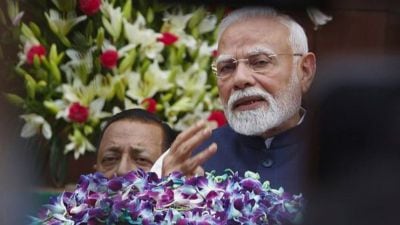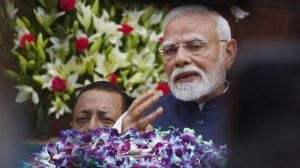Curtains for SWAT team soon, fate of its elite commandos unclear
Chief Minister Amarinder Singh has given in principle approval for the SOG, and suggested its personnel could be sent to Israel for training. The annual expenditure on it has been estimated at about Rs 5.7 crore
 hief Minister Amarinder Singh has given in principle approval for the SOG, and suggested its personnel could be sent to Israel for training (Image of NSG Commandos Via Wiki Media Commons)
hief Minister Amarinder Singh has given in principle approval for the SOG, and suggested its personnel could be sent to Israel for training (Image of NSG Commandos Via Wiki Media Commons)
With the Punjab government all set to introduce a new anti-terror Special Operations Group (SOG), it will soon be curtains for the six-year-old Special Weapons And Tactics (SWAT) team constituted in 2011. The SWAT has 40 personnel drawn from armed battalions of Punjab Police, who were trained by Israeli experts in a three month capsule course. Later, they also received training from the National Security Guard at Manesar.
With SOG in the offing, it is unclear where the once elite commandos, who got the only opportunity to put their training to use in the July 2015 Dinangar terrorist attack, will be absorbed in the police force. Chief Minister Amarinder Singh has given in principle approval for the SOG, and suggested its personnel could be sent to Israel for training. The annual expenditure on it has been estimated at about Rs 5.7 crore. Meanwhile, the fate of SWAT is illustrative of the fate of many ambitious, but poorly planned initiatives.
Israeli experts had trained SWAT personnel in Krav Maga (contact-combat), an Israeli military training system to combat terror with a combination of simultaneous maneuvers of attack and defensive tactics. The training was done by a private Israeli firm, which was paid approximately Rs 1.5 crore.
Three years after the 2008 Mumbai terror attacks, the raising of a SWAT team was seen as a good move in a state that has an International Border with Pakistan. But the government appeared to have had second thoughts about it almost immediately. For one, it was never formally notified; and the numbers remained what they were to begin with.
After its formation in 2011, when the first batch of SWAT personnel were trained, no effort was made to induct more personnel into the group. This, in fact, was one of the justifications given for the creation of SOG. “SWAT was a good idea, but there was no proper follow up. There should have been rotation and younger lot should have been inducted. Also, it should have been expanded to make more SWAT teams,” said Rakesh Chandra, ADGP in-charge of the commando battalions, seeming to distance himself from the commando unit, even though he was its in-charge at that time too.
“Today, SWAT personnel feel duped. They were promised inter-cadre transfer after serving with SWAT for some years. But that never happened. They got stuck in SWAT itself. SWAT started with a strength of 40 personnel. Today, about 30 personnel are left, and most of them are over or around 40 years of age,” Chandra said.
Under the proposed SOG, Chandra added, there would be an amendment to the Punjab Police Act 2007 to allow inter-cadre transfer. Any personnel serving in SOG for a minimum of five years would get inter-cadre transfer to a district of his choice.
It is proposed to have 278 SOG personnel, divided in with three teams, and each team will be further divided into three sub-teams, each sub- team comprising of 27 personnel. “With nine sub teams, we will be able to counter multiple, if any, terror acts. This will be in contrast to the SWAT team which could be deployed for only one operation at a time due to its limited strength,” Chandra said. Punjab DGP Suresh Arora was not available for comment.
Besides SWAT, Punjab has other commando units – four Special Strike Group units, each of 25 to 30 personnel, and Ghatak, another 26-member anti-terror team which was constituted after the Dinanagar terrorist attack and which was trained by experts from Army among others. Their fate, in the light of the decision to set up the SOG, is unclear.
“Though the Special Strike Groups and Ghatak teams’ personnel have been trained, they cannot carry out independent operations. They need support. SOG will be self-dependent and self-reliant in terms of arms, ammunition and latest state of the art weaponry,” Chandra said, adding “SOG will have legal back up. The proposal would be placed before Cabinet for clearance and there would be a notification.”












